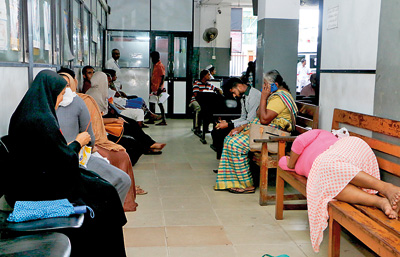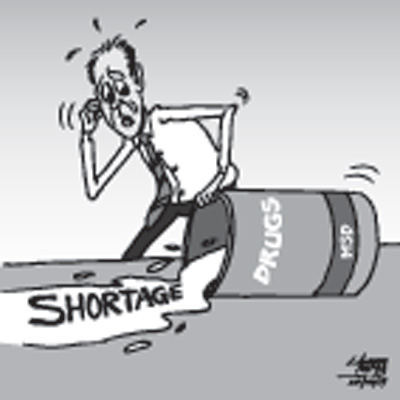News
Hundreds of drugs not available in public hospitals
A shortage of medical supplies, including drugs and consumables has been reported from hospitals, although health officials have been disregarding the shortfalls.

The GMOA launched an island wide token strike recently with regard to eight demands, among them being the shortage of drugs. Pix by Priyanka Samaraweera
A senior official of the Matale District General Hospital, told the Sunday Times, that there is a drug shortage and this happens from time to time.
“Out of 19,000 drugs imported to Sri Lanka there is a shortage in 200 drugs,” he said.
The director of the Kurunegala Teaching Hospital, Dr. A.M.S. Weerabandara concedes that there is a shortage in drugs and consumables at the hospital.
Naming a few he pointed out that the cardiology unit still requires catheters and balloons and the ultrasound gel. “We are trying to fill the dearth of drugs by way of local purchasing from private institutions and Ayurvedic centres,” he said.
The Medical Supplies Division (MSD) however, said that there is no such significant drug shortage and that only about 100 medical supplies have are stock from the average 14,000 items in Sri Lanka.
The director of the division, Dr. A.T. Sudarshana told the Sunday Times, alternatives are being sought. “We have diverted to alternatives such as; local market purchasing, redistribution among hospitals and using substitute drugs,” he said.
He alleged that some doctors are trying to prejudice the mindset of the people to divert patients to their private practices
“We have recognised the shortage and we have instructed the heads of hospitals to seek alternatives,” he said.
Dr. Sudarshana emphasised that the general shortage occurs as a result of the delays in the annual supply due to the late tender procedures.
Meanwhile, the Government Medical Officers’ Association (GMOA) launched an island wide token strike on Thursday, August 22, with regard to eight demands and has given authorities two weeks.
The GMOA’s demands are:
- Low quality drugs to patients and the present severe shortage of drugs within government hospitals.
- Attempts to unilaterally amend the medical services minute of doctors.
- Attempts to pass the Quality Assurance and Accreditation Council (QAAC) Act in parliament, from which the role of SLMC would be nullified.
- Political influences on transfer schemes of all categories of medical officers and the violations of existing transfer circular.
- Not solving the present internship crisis and related issues.
- Unacceptable delay in preparation of North and East transfer (repeat) list and the post intern (repeat) list
- Not tabling the minimum standard of Medical Education in Parliament.

The secretary of the association Dr. Haritha Aluthge, said that, the allegation on the shortage of drugs and distributing low quality drugs was based on Auditor General reports and individual reports received by hospitals.
He claimed that drugs issued to the cancer hospital and chest clinics have been limited. According to him, low quality drugs have been issued to diabetic patients.
| Antibiotics, stents costlier | |
| Health Minister Dr. Rajitha Senaratne told Parliament that prices of drugs are being increased by 14 per cent as a result of a stronger US dollar. He said that, the prices of certain drugs such as Amoxicillin, Clarithromycin, Azithromycin, Losartan, Rosuvastatin, Aspirin, Ibuprofen, Omeprazole and Paracetamol, to name a few, have been increased. According to Mr Senaratne, a metal stent the cost of which was Rs. 24,000 has been increased to Rs. 27,450 and the drug eluting stent has been increased from Rs. 105,000 to Rs 120,000. However, a decision has been made not to increase the prices of cancer drugs due its highest purchases being made by the government, that is around 95 per cent. “In India the government has been given the discretion to increase drugs by 10 per cent, we have not allowed this in our country,” he said. Mr Senaratne said that according to the medical audit of 2017 by Professor Priyadarshini Galappaththi, through the reduction of drug prices on previous occasions, there was a profit of Rs. 4.4 billion. He said that the government has only increased prices on two occasions, and in the future depending on the fluctuation of the US dollar rate the prices may vary. |

